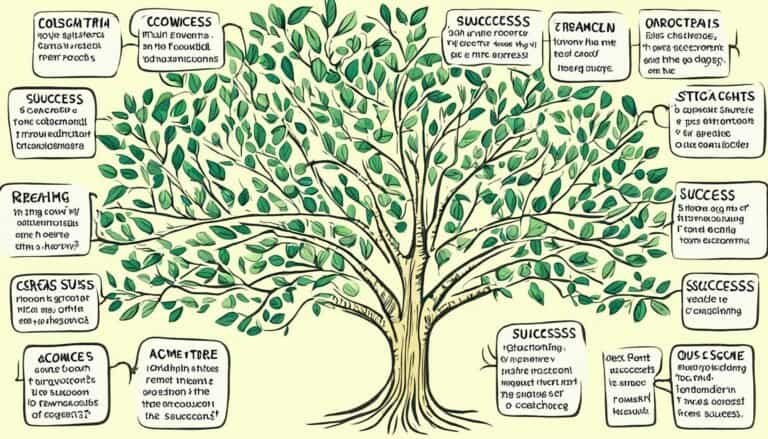What Is Leadership Coaching?
They say that 'leaders are made, not born.' But what exactly does it mean to be a leader? And how can one develop the skills and competencies necessary to lead effectively?
This is where leadership coaching comes in. Leadership coaching is a dynamic and transformative process that helps individuals unlock their full potential as leaders. It goes beyond traditional training methods, providing personalized guidance and support to help you become the best leader you can be.
But what exactly does it entail? And how can it benefit you and your organization?
Let's explore the world of leadership coaching and discover how it can help you excel in your leadership journey.
Key Takeaways
- Leadership coaching is a transformative process that empowers individuals to enhance their leadership skills and achieve their full potential.
- Coaching methodologies such as goal setting and active listening guide individuals in their development.
- Leadership coaching increases self-awareness, enhances communication skills, and fosters personal growth.
- Organizations that invest in leadership coaching experience increased employee engagement and retention.
Definition of Leadership Coaching
Leadership coaching is a transformative process that empowers individuals to enhance their leadership skills and achieve their full potential. When it comes to leadership coaching, there are numerous benefits and techniques that can help individuals develop their leadership abilities.
One of the key benefits of leadership coaching is increased self-awareness. Through coaching, individuals gain a deeper understanding of their strengths and weaknesses as leaders. This self-awareness allows them to make more informed decisions and take actions that align with their values and goals.
Another benefit of leadership coaching is improved communication skills. Effective communication is essential for successful leadership, and coaching can help individuals develop the ability to clearly articulate their thoughts and ideas. This skill is crucial for building strong relationships, motivating teams, and inspiring others to take action.
Leadership coaching also focuses on developing emotional intelligence. Emotional intelligence refers to the ability to understand and manage emotions, both in oneself and in others. By honing this skill, individuals can effectively navigate challenging situations, build trust, and create a positive and supportive work environment.
In terms of techniques, leadership coaching often involves goal setting. Coaches work with individuals to set specific, measurable, achievable, relevant, and time-bound (SMART) goals. These goals provide a roadmap for personal and professional growth, allowing individuals to track their progress and celebrate their achievements.
Another technique used in leadership coaching is feedback. Coaches provide constructive feedback to individuals, highlighting areas for improvement and offering suggestions for growth. This feedback is essential for self-reflection and continuous improvement.
Key Components of Leadership Coaching
Now let's explore the key components of leadership coaching.
This discussion will focus on the benefits of coaching and the various methodologies used in leadership coaching.
Benefits of Coaching
Coaching offers a range of valuable benefits to enhance your leadership skills and performance.
One of the key benefits is career advancement. Through coaching, you can gain the necessary skills and insights to excel in your current role and prepare for future leadership opportunities. By working with a coach, you can identify your strengths and weaknesses, set goals, and develop strategies to overcome obstacles and reach your full potential.
Another important benefit of coaching is improved communication. Effective communication is essential for successful leadership, and coaching can help you enhance your communication skills, both in one-on-one interactions and in group settings. With coaching, you can learn how to listen actively, express yourself clearly, and build positive relationships with your team members and colleagues.
Coaching Methodologies
To further enhance your leadership skills and performance, it's important to explore the key components of coaching methodologies.
Coaching techniques play a crucial role in leadership coaching, as they provide the framework for guiding and supporting individuals in their development. These techniques can include goal setting, active listening, powerful questioning, and providing constructive feedback.
By employing these methodologies, coaches help leaders identify their strengths and areas for improvement, set meaningful goals, and develop action plans to achieve them.
Coaching outcomes can vary depending on the individual's needs and goals, but common results include increased self-awareness, enhanced communication skills, improved decision-making abilities, and greater confidence in leadership roles.
Understanding and utilizing effective coaching methodologies can significantly contribute to your growth as a leader.
Benefits of Leadership Coaching
Now let's explore the benefits of leadership coaching.
By engaging in coaching, you can increase your self-awareness and gain a deeper understanding of your strengths and areas for improvement.
This heightened self-awareness can lead to enhanced decision-making skills, allowing you to make more effective and informed choices as a leader.
Increased Self-Awareness
Increased self-awareness is a key benefit of leadership coaching, enabling you to gain a deeper understanding of your strengths, weaknesses, and areas for growth. This heightened self-awareness allows you to become more attuned to your communication style and helps you identify areas where you can improve.
With a better understanding of yourself, you can enhance your communication skills and become more effective in conveying your ideas and connecting with others. Additionally, increased self-awareness through leadership coaching fosters personal growth. It allows you to identify your limitations and work on them, enabling you to develop new skills and expand your leadership capabilities.
Ultimately, the increased self-awareness gained through leadership coaching empowers you to become a more confident and effective leader, leading to greater success and fulfillment in your professional journey.
Enhanced Decision-Making Skills
Leadership coaching enhances your decision-making skills, allowing you to make informed choices with confidence and clarity. Through this process, you develop enhanced problem-solving abilities and critical thinking skills that enable you to approach complex challenges more effectively.
A leadership coach helps you identify and analyze different options, consider potential risks and benefits, and evaluate the best course of action. They encourage you to think critically, challenge assumptions, and explore alternative perspectives. With their guidance, you learn to gather and assess relevant information, weigh different factors, and make sound decisions based on logic and evidence.
This enhanced decision-making ability empowers you to navigate uncertainties, make tough choices, and achieve your goals with a greater sense of certainty and success.
Process of Leadership Coaching
To effectively engage in leadership coaching, it's crucial to understand and implement a well-defined process. The process of leadership coaching involves several key steps that help guide the coaching relationship and ensure its effectiveness. Here are three important elements of the leadership coaching process:
- Establishing goals: The first step in the coaching process is to identify and establish clear goals that the coachee wants to achieve. These goals should be specific, measurable, achievable, relevant, and time-bound (SMART). By setting clear goals, both the coach and the coachee have a shared understanding of what success looks like.
- Assessing strengths and weaknesses: Once the goals are established, the coach works with the coachee to assess their strengths and weaknesses. This assessment helps identify areas where the coachee can leverage their strengths and areas where they need to develop new skills or improve existing ones.
- Developing a coaching plan: Based on the assessment, the coach and coachee collaborate to create a coaching plan. This plan outlines the specific actions, strategies, and resources that will be used to achieve the desired goals. The coach provides guidance, support, and feedback throughout the coaching process to help the coachee stay on track and make progress.
Skills and Competencies Developed in Leadership Coaching
Through leadership coaching, you'll develop a range of essential skills and competencies that will enhance your effectiveness as a leader.
One of the key skills that you'll develop is emotional intelligence. Emotional intelligence refers to the ability to recognize and understand your own emotions, as well as the emotions of others, and to use this understanding to guide your thinking and behavior.
By developing your emotional intelligence, you'll be better equipped to manage conflict, build strong relationships, and inspire and motivate your team.
Another important skill that you'll develop through leadership coaching is communication skills. Effective communication is essential for successful leadership.
It involves not only being able to clearly convey your thoughts and ideas, but also actively listening to others and being able to understand and respond to their needs.
Leadership coaching will help you improve your communication skills, enabling you to articulate your vision and goals, provide feedback and guidance, and foster open and honest dialogue within your team.
How Leadership Coaching Can Impact Individuals and Organizations
The impact of leadership coaching on individuals and organizations is profound and far-reaching. Here are three ways in which leadership coaching can have a significant and lasting effect:
- Impact on organizational culture: Leadership coaching helps individuals develop a stronger sense of self-awareness and emotional intelligence. This, in turn, enhances their ability to lead and positively influence others. As leaders become more self-aware, they can foster a culture of trust, open communication, and collaboration within the organization. This shift in culture can lead to improved employee engagement, increased productivity, and a more harmonious work environment.
- Long-term effects: Leadership coaching goes beyond short-term fixes and focuses on long-term growth and development. By providing individuals with the necessary tools and strategies, coaching enables them to become more effective leaders, not just in their current roles but also in future positions. This long-term focus on leadership development ensures a pipeline of capable leaders who can drive the organization's success and sustainability.
- Enhanced performance and results: Leadership coaching helps individuals identify and overcome their limiting beliefs and behaviors. By challenging and supporting them to reach their full potential, coaching enables leaders to perform at their best. This improved performance translates into better organizational outcomes, such as increased innovation, better decision-making, and higher levels of employee satisfaction and retention.
Conclusion
So, now you know what leadership coaching is all about. It may sound like just another management buzzword, but it's actually a powerful tool for personal and professional growth.
Some may argue that leadership coaching is only for top-level executives or those with specific leadership roles. However, the truth is that anyone can benefit from it. Whether you're a manager, team leader, or aspiring to be one, leadership coaching can help you enhance your skills and make a positive impact on yourself and your organization.







